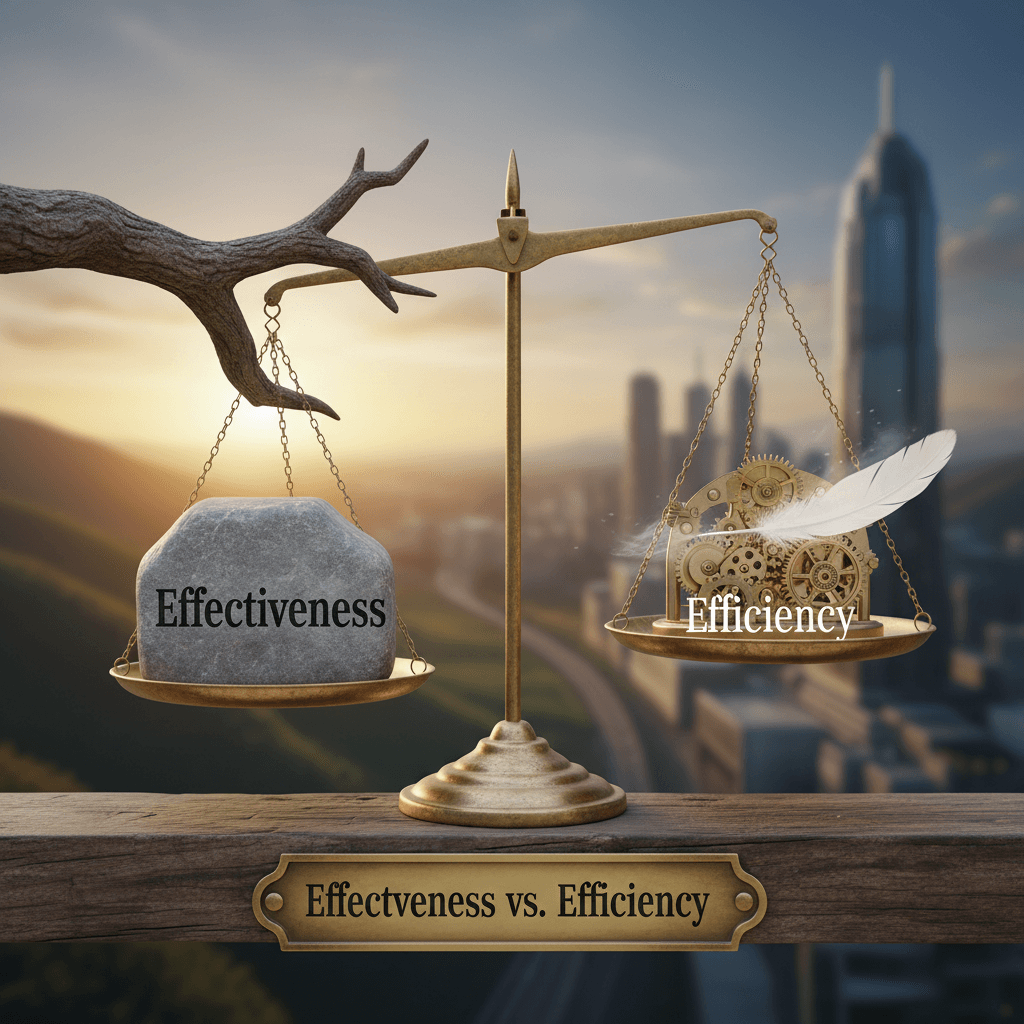Effectiveness vs. Efficiency: What’s the Difference?
 Effectiveness and efficiency are often confused, but they describe two distinct qualities of performance.
Effectiveness and efficiency are often confused, but they describe two distinct qualities of performance.
- Effectiveness = achieving the goal.
- Efficiency = achieving the goal with minimal waste (time, effort, or cost).
Let’s look at them one by one.
Effectiveness: Doing the Right Thing
Meaning
Effectiveness means how well you achieve your intended goal or result.
It’s about success — whether something works as planned.
Examples (10 total)
- The new ad campaign improved sales, showing its effectiveness.
- The medicine’s effectiveness depends on proper dosage.
- The teacher measured the effectiveness of her new teaching method.
- The meeting was short but very effective.
- His leadership style proved effective in tough situations.
- The company tested the effectiveness of its marketing strategy.
- This software’s effectiveness lies in its simplicity.
- The training increased the effectiveness of the team.
- We need to evaluate the effectiveness of this plan.
- The effectiveness of communication determines project success.
🧠 Tip:
If it’s about achieving goals or producing results, you’re talking about effectiveness.
Efficiency: Doing Things the Right Way
Meaning
Efficiency means how well you use resources (time, money, energy) to achieve a goal.
It’s about optimization — achieving results with the least waste.
Examples (10 total)
- The new machine increased production efficiency.
- She works with great efficiency, finishing tasks quickly.
- Energy efficiency helps save both power and cost.
- The company improved efficiency by automating reports.
- The car’s fuel efficiency makes it eco-friendly.
- Our team’s efficiency doubled after using new tools.
- Efficiency is about how you do things, not what you do.
- The manager praised the team for their efficiency.
- Updating the software improved workflow efficiency.
- The key to success is balancing efficiency with quality.
🧠 Tip:
If it’s about saving time, cost, or effort, it’s efficiency.
Quick Comparison Table
| Feature | Effectiveness | Efficiency |
|---|---|---|
| Meaning | Achieving goals or desired results | Using resources wisely while achieving goals |
| Focus | What is achieved | How it’s achieved |
| Goal | Do the right thing | Do things right |
| Measure | Outcome success | Resource optimization |
| Example | The campaign increased sales. | The campaign achieved sales using less budget. |
How to Remember the Difference
👉 Effectiveness = Reaching the goal 🎯
👉 Efficiency = Reaching it faster, cheaper, or smarter ⚙️
💡 Memory Trick:
“Effectiveness gets you there; efficiency gets you there faster.”
In Business Terms
- A company can be effective (it meets sales targets) but inefficient (it wastes money doing so).
- Another company can be efficient (it saves costs) but ineffective (it doesn’t meet goals).
- True success requires both.
Example:
- Effective: The marketing campaign got 1,000 new customers.
- Efficient: It got them with only $100 in ads.
Why People Mix Them Up
They both sound like “success” words, but one measures results and the other measures process.
Even professionals confuse them, which is why Humanizey helps refine tone and clarity automatically — making complex distinctions sound human and natural.
FAQs
1. Can something be efficient but not effective?
Yes. You can work efficiently on the wrong task — doing it fast but achieving nothing useful.
2. What’s more important in management: effectiveness or efficiency?
Effectiveness comes first. Efficiency only matters once you’re doing the right thing.
3. Are effectiveness and productivity the same?
Not exactly. Productivity measures output, while effectiveness measures goal achievement.
4. Can you measure effectiveness?
Yes — through KPIs, outcomes, or success rates, depending on your goal.
Practice: Choose the Correct Word (“Effectiveness” or “Efficiency”)
(Answers are listed at the end.)
- The new software improved work ___.
- We’re testing the ___ of the new vaccine.
- His ___ at completing reports saved the team hours.
- We must focus on ___ before optimizing the process.
- The team increased ___ by reducing energy waste.
- The campaign’s ___ was proven by higher sales.
- Improving ___ can reduce costs without hurting results.
- We need to measure both ___ and ___.
- The project’s ___ is shown in the positive feedback.
- Automation improved the factory’s ___.
Answers
- efficiency
- effectiveness
- efficiency
- effectiveness
- efficiency
- effectiveness
- efficiency
- effectiveness / efficiency
- effectiveness
- efficiency
